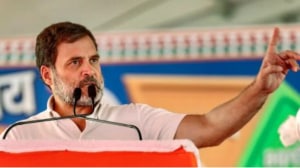A basketcase of Garlic
Nozizwe Madlala-Routledge, one of the most talked-about figures in South Africa these days, wanted to be a scientist.

Nozizwe Madlala-Routledge, one of the most talked-about figures in South Africa these days, wanted to be a scientist. She says she sacrificed her ambition on the altar of principle.
Madlala, as she was then known, was pursuing a science degree at the University of Fort Hare, an apartheid-era haven for black scholars that counts Nelson Mandela among its alumni. It was 1972, and after the government barred black parents from commencement ceremonies at another university, Fort Hare students mounted a boycott, which Madlala joined. The school administration expelled her, and said she could be readmitted only if she apologised. She refused. “I didn’t see what I had to apologise for,” she said. “So I lost my place at Fort Hare.”
Thirty-five years later, Madlala-Routledge has been expelled again — this time, from her post as South Africa’s deputy health minister—- and once again, she sees no reason to apologise. Since President Thabo Mbeki dismissed her in mid-August, citing a list of political and managerial lapses, both she and South Africa’s beleaguered health ministry have been the subjects of fierce debate.
Madlala-Routledge’s supporters say she was the lone voice of principle in a health ministry sullied by its lackadaisical response to South Africa’s AIDS crisis. When the government finally adopted an aggressive anti-AIDS strategy in December, after years of international criticism, Madlala-Routledge was among the principal authors.
To her supporters, the dismissal is fresh evidence of a deep antipathy toward AIDS science on the part of both Mbeki and his political ally, the much-maligned health minister, Manto Tshabalala-Msimang.
On the other hand, Madlala-Routledge’s critics say she is a headline-grabbing gadfly. In mid-August, Mbeki devoted his weekly Internet essay to a harsh attack on Madlala-Routledge, calling her a “lone ranger” who willfully ignored orders. Any suggestion that her dismissal will affect South Africa’s AIDS strategy, he wrote, is “extraordinarily absurd”.
Madlala-Routledge does not directly contest that. Deputy President Phumzile Mlambo-Ngcuka, Madlala-Routledge’s friend for 20 years, continues to oversee the strategy, she said.
Madlala-Routledge is not easy to pigeonhole. At 55, she is a veteran of South Africa’s liberation struggle, a Communist, a Quaker, a fairly canny politician with a seat in South Africa’s Parliament and, by training, a medical technician with an interest in immunology. Tall, hefty and soft spoken, she is nobody’s vision of a rabble-rouser.
Mbeki moved her to the health ministry’s No. 2 slot in 2004. In ministry meetings, she said, she pushed for a more forceful approach to South Africa’s HIV crisis, which kills 800 people a day and infects thousands more and was met, she said, by growing resistance from the health minister. Called Garlic Manto by her detractors, Tshabalala-Msimang emphasised so-called African solutions to HIV, including diets of garlic, beetroot and African potatoes. She also suggested that anti-AIDS drugs were dangerous.
In 2005, after publicly disagreeing with her boss over the primacy of nutrition as a defence against HIV, Madlala-Routledge was summoned to Mbeki for the woodshed treatment.
She remained in the shadows until late 2006, when Tshabalala-Msimang exhibited baskets of garlic and other supposed anti-AIDS foods at an international conference on HIV, raising a global outcry. Shortly afterward, the minister fell ill, and during her absence Madlala-Routledge’s old ally, the deputy president, summoned her to rewrite South Africa’s AIDS strategy.
That strategy remains in force, but Madlala-Routledge no longer helps direct it. Late in 2006, she said, she heard rumours that her time in Mbeki’s government was near an end.
In July, she raised eyebrows when she accompanied a journalist to a rural hospital with a high rate of infant deaths, then called conditions there a national emergency. Tshabalala-Msimang publicly and vigorously disagreed. A few weeks later, Madlala-Routledge was unemployed.
- 01
- 02
- 03
- 04
- 05































